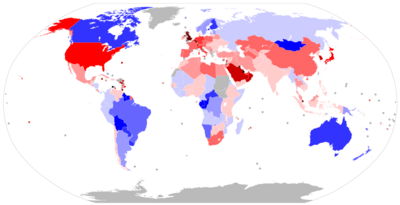Global Footprint Network
Topic: Organization
 From HandWiki - Reading time: 4 min
From HandWiki - Reading time: 4 min

| x ≤ -9 -9 < x ≤ -8 -8 < x ≤ -7 -7 < x ≤ -6 -6 < x ≤ -5 | -5 < x ≤ -4 -4 < x ≤ -3 -3 < x ≤ -2 -2 < x ≤ -1 -1 < x < 0 | 0 ≤ x < 2 2 ≤ x < 4 4 ≤ x < 6 6 ≤ x < 8 8 ≤ x Data unavailable |
The Global Footprint Network was founded in 2003 and is an independent think tank originally based in the United States, Belgium and Switzerland. It was established as a charitable not-for-profit organization in each of those three countries. Its aim is to develop and promote tools for advancing sustainability, including the ecological footprint and biocapacity, which measure the amount of resources we use and how much we have. These tools aim at bringing ecological limits to the center of decision-making.
Work
Global Footprint Network's goal is to create a future where all humans can live well, within the means of one planet Earth. The organization is headquartered in Oakland, California. The Network brings together over 70 partner organizations,[2] including WWF International, ICLEI, Bank Sarasin, The Pictet Group, the New Economics Foundation, Pronatura México, and the Environment Agency Abu Dhabi.
National Footprint and Biocapacity Accounts
Every year, Global Footprint Network produced a new edition[3] of its National Footprint and Biocapacity Accounts, which calculate Ecological Footprint and biocapacity of more than 200 countries and territories from 1961 to the present. Based on up to 15,000 data points per country per year, these data have been used to influence policy in more than a dozen countries, including Ecuador, France, Germany, Japan, Korea, the Philippines, Russia, Switzerland, and the United Arab Emirates. Since 2019, the National Footprint and Biocapacity Accounts are produced in collaboration between Global Footprint Network, York University,[4] and Footprint Data Foundation.[5]
The 2022 Edition of the National Footprint and Biocapacity Accounts cover 1961-2018 (latest UN data available), and incorporate data from the Food and Agriculture Organization, the UN Comtrade database, the International Energy Agency, and over 20 other sources.[6][7]
Ecological Footprint Explorer
In April 2017, Global Footprint Network launched the Ecological Footprint Explorer,[8] an open data platform for the National Footprint and Biocapacity Accounts.[9][10] The website provides ecological footprint results for over 200 countries and territories, and encourages researchers, analysts, and decision-makers to visualize and download data.
Earth Overshoot Day

Previously known as Ecological Debt Day, Earth Overshoot Day is the day when humanity has exhausted nature's budget for the year. For the rest of the year, society operates in ecological overshoot by drawing down local resource stocks and accumulating carbon dioxide in the atmosphere. In 2025, Earth Overshoot Day advanced to 24 July.[11]
Founding
In 2003, Mathis Wackernagel, PhD, and Susan Burns founded Global Footprint Network, an international think-tank headquartered in Oakland, California, with offices in Geneva and Brussels. Wackernagel received an honorary doctorate in December 2007 from the University of Bern in Switzerland.
Leadership
- Co-founder & President: Dr. Mathis Wackernagel
- Co-founder: Susan Burns
- Chief Executive Officer: Laurel Hanscom
- Chief Science Officer: Dr. David Lin
- Director, Marketing & Communications: Amanda Diep
- Director, Mediterranean and MENA Regions: Dr. Alessandro Galli
- Board Chair: Keith Tuffley
- Honorary Chair: Swiss entrepreneur and investor André Hoffmann
Awards and honours
- Nobel Sustainability Trust Leadership and Implementation Award 2024 to Mathis Wackernagel[12]
- World Sustainability Award 2018[13]
- International Association for Impact Assessment's Global Environment Award 2015
- RECYCLAPOLIS National Sustainability Award 2015
- ISSP Sustainability Hall of Fame Inductees Susan Burns and Mathis Wackernagel 2014
- Prix Nature Swisscanto 2013
- Global Footprint Network was recognized as one of the top 100 NGOs worldwide by the Global Journal in 2012 and 2013.[14][15]
- Blue Planet Prize 2012[16]
- Boulding Award 2012[17]
- Binding Prize 2012[18]
See also
- Ecological footprint
- Carrying capacity
- Demography
- Human overpopulation
- New Economics Foundation
- Sustainable development
References and further reading
- ↑ "Open Data Platform". https://data.footprintnetwork.org.
- ↑ "Partner Network - Global Footprint Network". https://www.footprintnetwork.org/about-us/partner-network/.
- ↑ "NFA 2017 Edition - dataset by footprint". https://data.world/footprint/nfa-2017-edition.
- ↑ "The Ecological Footprint Initiative". https://footprint.info.yorku.ca/.
- ↑ "FoDaFo wants a future where all can thrive within the means of our one Earth.". https://www.fodafo.org/.
- ↑ "Data and Methodology - Global Footprint Network". https://www.footprintnetwork.org/resources/data/.
- ↑ Borucke M, Moore D, Cranston G, Gracey K, Iha K, Larson J, Lazarus E, Morales JC, Wackernagel M, Galli A. 2013. Accounting for demand and supply of the Biosphere's regenerative capacity: the National Footprint Accounts' underlying methodology and framework. Ecological Indicators, 24, 518-533.
- ↑ "Open Data Platform". https://data.footprintnetwork.org/.
- ↑ "Ecological Footprint Explorer Open Data Platform Launches April 5, 2017". www.prnewswire.com. http://www.prnewswire.com/news-releases/ecological-footprint-explorer-open-data-platform-launches-april-5-2017-300434721.html.
- ↑ (in en) National Footprint Accounts – Ecological Balance Sheets for 180+ Countries, https://www.youtube.com/watch?v=_T5M3MiPfW4, retrieved 2022-01-24
- ↑ 11.0 11.1 "Past Earth Overshoot Days". Earth Overshoot Day. 2025. https://overshootday.org/newsroom/past-earth-overshoot-days/.
- ↑ "Sustainability Awards Presented by the Nobel Sustainability Trust". https://www.tum.de/en/news-and-events/all-news/press-releases/details/sustainability-awards-presented-by-the-nobel-sustainability-trust.
- ↑ "About Us - Global Footprint Network". https://www.footprintnetwork.org/about-us/.
- ↑ "#97 - Global Footprint Network | The Global Journal". https://theglobaljournal.net/article/view/494/.
- ↑ "Special Feature: The Top 100 NGOs 2013 Edition | The Global Journal". http://theglobaljournal.net/group/15-top-100-ngos-2013/article/986/.
- ↑ "About the Blue Planet Prize | Blue Planet Prize" (in en). https://www.af-info.or.jp/en/blueplanet/list.html.
- ↑ "ISEE 2012 in RIO" (in en-US). 2012-01-26. https://www.isecoeco.org/isee-2012-in-rio/.
- ↑ "Willkommen bei der Binding Stiftung ...". http://www.binding.li/html/home.html.
External links
- Global Footprint Network official website
- Global Footprint Network's Ecological Footprint Explorer
- Earth Overshoot Day official website
 |
 KSF
KSF